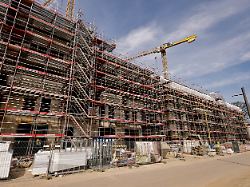Construction crisis at Maischberger
“Need to introduce massive interest rate cutting programs”
By Marko Schlichting
September 29, 2023, 4:11 a.m
Listen to article
This audio version was artificially generated. More info | Send feedback
There is too little building going on in Germany. Why? The standards have become ever higher in the last few decades – and given the current high interest rates, that is simply too expensive, says building contractor Christoph Gröner at Maischberger. He only sees one possibility.
There is a construction crisis. This is how you can briefly describe the current situation. The traffic light coalition had set itself a noble goal when it came into power. 400,000 new apartments should be built every year. Federal Construction Minister Clara Geywitz has now admitted that this number cannot be achieved, at least in this legislative period. Only around 223,000 new apartments are expected to be built this year. Bad for those looking for housing, bad for the construction industry. What has to happen now? This is the topic on Thursday evening with Maybrit Illner on ZDF.
“Loan, loan, loan”
SPD General Secretary Kevin Kühnert cannot and does not want to say how many new apartments will be built in the next few years. “The construction minister doesn’t build the apartments herself. A lot of trades and players are involved,” he explains, passing the buck to the construction industry and the municipalities. It is now the government’s job to set up funding programs.
Everything could be so simple if Christoph Gröner had his way. The building contractor, who caused a stir three years ago with a 300,000 euro donation to the Berlin CDU, is head of Ecobuilding AG together with former CDU politician Ronald Pofalla. It is primarily involved in hybrid construction, in which houses are made from industrially manufactured components. Advantage: They can be raised comparatively quickly and, above all, inexpensively. The construction industry describes Gröner as a patient with open wounds and a viral infection who is lying on a stretcher, being treated with suppositories and having a continuous run ahead of him. He explains the high construction prices for real estate as follows: While interest rates have become ever lower, construction standards have become ever higher and more expensive. Now interest rates have risen significantly. “Now it becomes clear what has been done over the last twenty years,” says Gröner. Because standards such as sound insulation or thermal insulation cannot be reduced, the entrepreneur has only one solution: “You have to introduce massive interest rate reduction programs.” If the federal government were to reduce loans properly, it could expect up to 100,000 more apartments and rents would also be lower. “I want loans for my customers, for every investor, for rich and poor,” said the entrepreneur.
“The cranes are still turning, but they will come to a standstill,” warns Jörg Dittrich. The President of the Central Association of German Crafts is happy that there is finally a government program. “But it’s too late.” CDU politician Julia Klöckner also sees it that way. The Union has also planned 400,000 new apartments annually. “And we could have done it,” she claims. The federal government has created funding chaos in less than two years. The KFW funding program was stopped at short notice, construction standards for building insulation that were once discussed should no longer apply to new buildings, and then the Building Energy Act should also be revised shortly after the Bundestag passed its amendment. “The government’s 14-point plan presented on Monday contains resolutions and declarations of intent. It will take a very long time for the federal government to get this together. But the pressure is now there.” That’s why Klöckner is urgently calling on the federal government to provide tax incentives, support programs such as discounted loans and a reduction in construction costs.
“Tenants pay the bill”
Wibke Werner is disappointed. She heads the Berlin Tenants’ Association and criticizes: Tenants were not taken into account in the federal government’s 14-point program, and that is 55 percent of the population. In its coalition agreement, for example, the federal government promised a cap in tense housing markets. She is currently repeatedly registering violations of rent controls, an increase in terminations for personal use and, above all, horrendous additional payments for heating bills that tenants come to her with. In addition, renovations led to an increase in rental costs. Wibke Werner: “When you talk about renovations, you can’t ignore tenant protection and let everything run as before. Because then it will actually be expensive in the end. Then it’s the tenants who have to foot the bill.”
One thing is clear: the government’s program presented on Monday still needs to be changed. But there isn’t much time left. “We finally have to get started,” demands Jörg Dittrich, and Julia Klöckner also demands: “We finally have to get started.”
